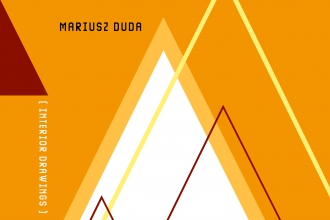Release date: December 10th, 2021 on Bandcamp; December 17th on all other streaming services, and on cassette.
Mariusz Duda: all instruments and vocals
Tracklist
- Racing Thoughts
- Interior Drawings
- Shapes in Notebooks
- Prisoner by Request
- Dream of Calm
- How to Overcome Crisis
- Almost Done
- Temporary Happiness
Interior Drawings is the third album in the Lockdown Trilogy that was begun back in 2020 during the first wave of the pandemic, and added to in the spring of 2021 during some subsequent wave. The first two albums are rather existential in theme, dealing with the emotional response to literal lockdowns and enforced isolation. This one is not.
This time around, Duda has presented us with an exercise in recursiveness: he’s made a fascinating attempt to use music to represent the process of creating music – at least, Mariusz Duda’s mode of creating music. Each song represents a step along the way, from initial inspiration (“Racing Thoughts”) through battling creative roadblocks (“How to Overcome Crisis”) to the final product (“Temporary Happiness”). This makes Interior Drawings a much more literal album than the others. There is isolation here, but it is the kind of self-isolation required in order to complete a project, and not imposed from outside. It’s an intriguing approach, and it will be interesting to see (hear?) if he has succeeded.
Each track tries to evoke the mood and experience suggested in the title. While I don’t plan to discuss each song on the album, some of them really do give us a sensory glimpse into the process of creating. The first track, “Racing Thoughts”, is piano-heavy, and fast — we feel the initial swirl of ideas, and the intensity of trying to capture them,pinning them down. There is a palpable sense of the excitement of starting a fresh project.
“Interior Drawings” starts with the sounds of drawing – literally. Duda has even posted a short video of this: pencil in hand, drawing a square, circle, triangle, over and over, a visual representation of the musical representation of the making of this music (did I mention the recursiveness of the album?); then bass and electronic percussion start to build. Clearly these are the initial ideas taking shape; the song winds up with a rather beautiful piano theme, something that would not be out of place as an outro on a Lunatic Soul or Riverside track.
At the moment my favourite piece is “Almost Done”, a track of impelling forward movement, dark and full of synths and electronic drums, with little familiar themes tracking in the background. This really does give the feeling of the end in sight, racing towards the goal.
The album (and our journey into the making of the album) ends with “Temporary Happiness”: more upbeat and brighter, a nice smooth melody and soft vocals – appropriate given that the project is finally done. It ends – again literally – with the sounds of someone locking doors, street noises, steps walking away as the last repetitive theme fades into the background. A final soft chuckle, and it’s done.
As with the other albums in the trilogy, Interior Drawings is minimalist, mostly instrumental, mostly electronic, created largely on digital instruments. However, Duda makes great use of analogue piano and adds more vocals. There is also more straight melody here – in fact, there is much that is reminiscent of Lunatic Soul, or at least of Under the Fragmented Sky, in its moody electronic jaggedness. It does remain distinct though – the whole trilogy does – from Duda’s other projects.
Interior Drawings is a richer, denser, more melodic album than the other two in the Lockdown Trilogy. While I think that it lacks some of the overall diversity of Claustrophobic Universe, the addition of real piano and vocals adds depth to it: the album feels more grounded, more accessible. It is quite a personal album, too: we don’t often get an inside look at how creativity works, so we are privileged to go on a musical tour with Duda as he walks us through his process.
Interior Drawings, and the whole Lockdown Trilogy, give us a side of Mariusz Duda that he hasn’t had much chance to show us before, his main focus being on Riverside and Lunatic Soul. With this trilogy, he has reached back into his past, to his early influences and first musical loves, bringing them forward to this new reality. I think it is safe to say that Duda has a lot of ideas left to find and shape, and we look forward to hearing them for many years to come.

